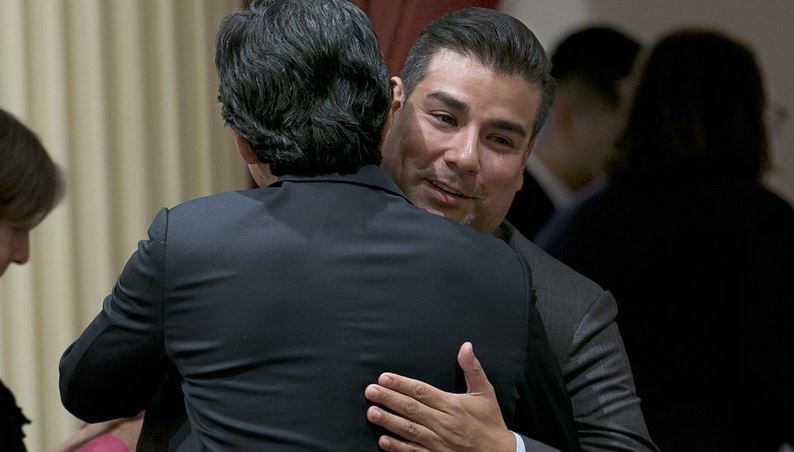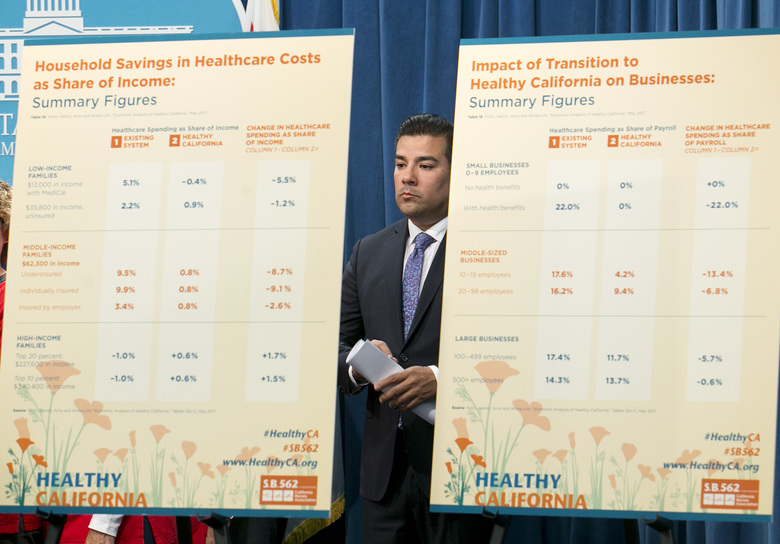The “repeal and replace” effort to eliminate the Affordable Care Act (ACA) as the law of the land has spun its wheels deep into the mud of the U.S. Senate, but that hasn’t stopped the California legislature from moving forward with their own compensatory plan to deliver single-payer health insurance to the most populous state in the nation.
“With President Trump’s promise to abandon the Affordable Care Act as we know it, it leaves millions without access to care and Californians are once again tasked to lead,” said California State Senator Ricardo Lara, according to reporting in the Sacramento Bee. “Senate Bill 562 will finally enable California to cover all of its residents, creating a healthier and stronger state.”
In the face of speculation about the program’s high price tag, the California Senate last week passed a bill that lays out the promise of government-funded, universally-available healthcare for state citizens. Senate Bill 562 prevailed on a 23-14 vote.

State Sen. Ricardo Lara, D-Bell Gardens, right, is congratulated by Senate President Pro Tem Kevin deLeon after his single-payer health care plan was approved by the Senate, Thursday, June 1, 2017, in Sacramento, Calif. The longshot bill cleared a big hurdle Thursday when Senate Democrats voted 23-14 to send it to the state Assembly. (AP Photo/Rich Pedroncelli)
The next stop is the State Assembly, where deliberations are likely to get more contentious, if only because the Assembly is stuck with figuring out where the money will come from.
“We are not debating single payer today because we are not debating a funding source,” Ben Hueso, a Democratic state senator said, according to the Sacramento Bee. “We are not debating delivery of service. We are not debating where the health savings will come from. None of that is in the bill. This is the Senate kicking the can down the road to the Assembly and asking the Assembly to fill in all the rest of the blanks.”
Even supporters acknowledged that the plan is currently incomplete. It was termed as “a work in progress” by Lara, a co-sponsor of the bill.
“What we did today was really approve the concept of a single-payer system in California,” Lara added, according to The Mercury News.
In generals, details are sparse. The bill runs a meager 38 pages, leaving most logistics as phantoms. The senators were under a legislative deadline mandating a vote before the end of the week.

State Sen. Ricardo Lara, D-Bell Gardens, stands between a pair of charts outlining estimated cost savings concerning his single-payer health care bill at a Capitol news conference, Wednesday, May 31, 2017, in Sacramento, Calif. (AP Photo/Rich Pedroncelli)
At this point, it’s not even entirely clear if SB 562 could become law without first letting California voters weigh in directly, the result of a longstanding rule requiring governmental spending increases to appear on the ballot before being enacted.
While the decisive vote signals strong support for at least the concept of single-payer health insurance, opponents voiced a familiar concern about the basic capability of government to take on an initiative of such significance.
“This bill idealistically assumes California can deliver on its promise to 40 million people,” said Janet Nguyen, a Republican senator, according to the Associated Press. “Yet … the state is failing to sustain the current government-funded system, Medi-Cal, that only serves 14 million people.”
Although positioned as a direct response to the federal government’s contentious equivocating over the future of the ACA, this is not California’s first attempt to delivery single-payer health insurance. Bills providing government-funded healthcare were passed and then vetoed by then-Governor Arnold Schwarzenegger in 2006 and 2008.
Despite the heated rhetoric of those who are adamantly against deep government involvement in healthcare and the nerve-rattling uncertainty about how such a system would work, supporters of single-payer health insurance believe its time has come.
“There is a cultural shift,” RoseAnn DeMoro, the executive director of National Nurses United and the California Nurses Association, told The New York Times. “Healthcare is now seen as something everyone deserves. It’s like a national light went off.”
Filed Under: Industry regulations




